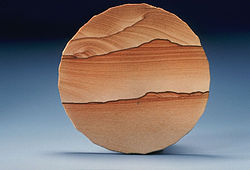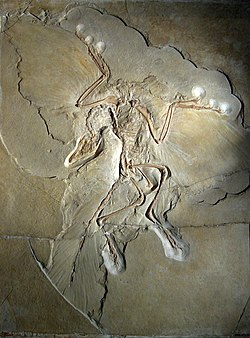Lithification (from the Ancient Greek word lithos meaning 'rock' and the Latin-derived suffix -ific) is the process in which sediments compact under pressure...
1 KB (158 words) - 16:53, 17 September 2024
eventually become sandstone and siltstone (sedimentary rocks) through lithification. Sediments are most often transported by water (fluvial processes),...
22 KB (2,825 words) - 19:28, 24 May 2025
and it undergoes diagenesis. This mostly consists of compaction and lithification of the sand. Early stages of diagenesis, described as eogenesis, take...
35 KB (3,945 words) - 19:17, 19 July 2025
begin to undergo diagenesis. This mostly consists of compaction and lithification of the clay and silt particles. Early stages of diagenesis, described...
21 KB (2,538 words) - 18:38, 21 July 2025
sediment after its initial deposition. This includes compaction and lithification of the sediments. Early stages of diagenesis, described as eogenesis...
65 KB (7,876 words) - 09:28, 26 July 2025
(authigenic) minerals. As a result, lithification of volcanic ash is one of the fastest low-temperature lithification processes. Alteration of volcanic...
7 KB (777 words) - 03:45, 5 May 2025
Tuff (section Transport and lithification)
such eruptions rapidly alters to palagonite as part of the process of lithification. Although conventional mafic volcanism produce little ash, such ash...
42 KB (4,868 words) - 08:27, 29 July 2025
surface or the seabed. Sedimentary rocks are formed by diagenesis and lithification of sediments, which in turn are formed by the weathering, transport...
31 KB (3,337 words) - 03:20, 29 June 2025
from initial erosion through sediment transport and settling to the lithification of the sediments. However, the strict geological definition of sedimentation...
10 KB (1,713 words) - 15:11, 16 July 2024
Armored mud ball (section Pre-lithification)
An armored mud ball is a small sedimentary structure, formed in flowing water, which consists of a fragment of clay or mud that has been rolled by currents...
14 KB (1,364 words) - 23:32, 22 May 2025
loose sediment into hard sedimentary rocks is called lithification. During the process of lithification, sediments undergo physical, chemical and mineralogical...
21 KB (2,644 words) - 08:16, 10 June 2025
depths greater than 1 km (0.62 miles), burial cementation completes the lithification process. Burial cementation does not produce stylolites. When overlying...
72 KB (8,473 words) - 18:12, 28 July 2025
mineral components as ions in solution. As rocks are buried, they undergo lithification and the connate fluids are usually expelled. If the escape route for...
5 KB (263 words) - 23:37, 18 June 2024
with silica. The specimen is transformed to stone (a process called lithification) as water is lost. For silicification to occur, the geothermic conditions...
14 KB (1,665 words) - 00:14, 4 June 2025
formed as a magnesium replacement of limestone or of lime mud before lithification. The geological process of conversion of calcite to dolomite is known...
31 KB (3,762 words) - 17:16, 23 June 2025
be formed from the lithification of these buried smaller fragments (clastic sedimentary rock), the accumulation and lithification of material generated...
18 KB (2,209 words) - 18:01, 26 May 2025
evidence for a forgery was based on unfamiliarity with the processes of lithification; for example, they proposed that, based on the difference in texture...
114 KB (11,974 words) - 19:33, 23 July 2025
dense that they would essentially form a rock. This process is known as lithification. Igneous rocks have crystallised from a melt or magma. The melt is made...
8 KB (997 words) - 15:16, 15 November 2024
Eolianite or aeolianite is any rock formed by the lithification of sediment deposited by aeolian processes; that is, the wind. In common use, however...
4 KB (455 words) - 20:54, 11 July 2025
of sediment and, therefore, the rock types that will be formed after lithification, if the sediment is preserved in the rock record. In most cases, the...
6 KB (655 words) - 15:55, 5 July 2024
processes can transform these sediments into rock through cementation and lithification, forming sedimentary rocks such as sandstone. These rocks can then in...
2 KB (193 words) - 12:11, 28 May 2025
transformation of poorly consolidated sediments into sedimentary rock (lithification) is simply accompanied by a reduction in porosity and water expulsion...
13 KB (1,453 words) - 01:29, 13 January 2025
to 392 °F). This excludes diagenetic changes due to compaction and lithification, which result in the formation of sedimentary rocks. The upper boundary...
51 KB (5,774 words) - 23:19, 23 June 2025
rigid-body rotation and translation of mineral grains or aggregates before lithification. Cataclastic rocks are associated with fault zones and impact event...
6 KB (716 words) - 22:24, 25 May 2025
In geology, consolidation is used in several senses: Lithification, the overall process of conversion of loose sediments to solid rock. Any other process...
1 KB (136 words) - 13:01, 14 October 2022
surrounding the remains, forming detailed casts of their structure. Lithification of the sediments formed protective nodules of ironstone around the now...
21 KB (2,180 words) - 10:18, 23 July 2025
conglomerate or breccia. Cementation occurs as part of the diagenesis or lithification of sediments. Cementation occurs primarily below the water table regardless...
6 KB (818 words) - 16:09, 17 May 2025
(when lithified) as diamictite. Tillite is a sedimentary rock formed by lithification of till. Glacial till is mostly derived from subglacial erosion and...
18 KB (2,242 words) - 09:29, 25 May 2025
Compaction of ceramic powders Compaction (geology), part of the process of lithification involving mechanical dewatering of a sediment by progressive loading...
874 bytes (127 words) - 20:19, 1 January 2025
sometimes be seen on the surface of the water. Carbonate cementation and lithification form slaps or pillars up to 4 m (13 ft) tall and support a rich biodiversity...
19 KB (2,156 words) - 22:17, 28 July 2025






















